|
|
|
Sort Order |
|
|
|
Items / Page
|
|
|
|
|
|
|
| Srl | Item |
| 1 |
ID:
131343
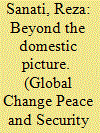

|
|
|
|
|
| Publication |
2014.
|
| Summary/Abstract |
This article examines the geopolitical determinants that have underpinned contemporary Iran-US relations, challenging the established thinking on why this relationship has been characterized by hostility. It is argued that the primacy that has been given to the role of domestic politics in either the US or Iran, as being the main arbiter of this relationship, is incomplete. This relationship is just as much a product of the structural conditions within the Middle East and the wider international system, which created the conditions for the clashing of the core national interests of both these states. However, due to the massive political and social alterations within the Middle East in the past decade, the notion of 'strategic irreconcilability' between both actors is now fundamentally changing. This has given room for a possible recalibration of the Iran-US relationship. Ultimately, it is argued that the synthesis of the domestic, the regional, and geopolitical levels of analysis are needed for a more holistic picture of the past, present, and future of Iran-US ties.
|
|
|
|
|
|
|
|
|
|
|
|
|
|
|
|
| 2 |
ID:
131345
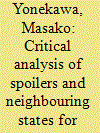

|
|
|
|
|
| Publication |
2014.
|
| Summary/Abstract |
Using Stephen J. Stedman's concept of spoilers as the main analytical framework, this paper offers insights into the failure of the United Nations peacekeeping mission in terms of civilian protection for a lengthy period in eastern Democratic Republic of the Congo. This failure arises not only from peacekeepers' failure to fully analyse the ambiguous status and relationship of spoilers and neighbouring states that are hostile to the peace process but also the United Nations' and peacekeepers' continuing support of spoilers and neighbouring states in three areas of implementation: military integration, military operations, and complacency regarding the chronic culture of impunity for key spoilers. Such support calls into question the neutrality of mediators and of the United Nations. The vicious cycle of violence created by spoilers and neighbouring states is likely to continue unless the United Nations develops appropriate preventive and proactive measures.
|
|
|
|
|
|
|
|
|
|
|
|
|
|
|
|
| 3 |
ID:
131347
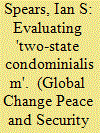

|
|
|
|
|
| Publication |
2014.
|
| Summary/Abstract |
At a time when Israelis and Palestinians are gathering in Washington to consider peace in the Middle East, most attention is focused on the idea of a one-state or, more likely, two-state solution. A number of scholars, however, have recently developed a third approach which has been appropriately referred to as a 'two-state condominialism'. This approach seeks to overcome the liabilities of the two existing approaches to solving the Middle East conflict while offering a number of its own advantages. Surprisingly, in spite of the similarities among their proposals, none of the authors make reference to, or even acknowledge each other. This article reviews these papers as a collective and considers whether they offer a realistic opportunity for peace in the Middle East.
|
|
|
|
|
|
|
|
|
|
|
|
|
|
|
|
| 4 |
ID:
131344
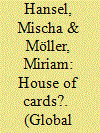

|
|
|
|
|
| Publication |
2014.
|
| Summary/Abstract |
India has always been a major troop contributor to UN peacekeeping missions. In recent years, however, the benefits of these efforts have been increasingly questioned by some of the country's strategic elites, as are some of the guiding norms of contemporary peace operations. This article scrutinizes the contemporary and historical plausibility of both ideational and materialistic explanations of India's comprehensive peacekeeping engagement. Against this backdrop, it provides an estimation of the likelihood of a future Indian retreat from these efforts. Our conclusions are neither reassuring nor alarmist. Status and economic considerations, normative disagreements, and growing frustration with the stalemate of UN reforms all complicate India's peacekeeping policies. Neither of them, however, unambiguously hints at a complete withdrawal.
|
|
|
|
|
|
|
|
|
|
|
|
|
|
|
|
| 5 |
ID:
131346
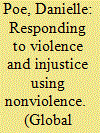

|
|
|
|
|
| Publication |
2014.
|
| Summary/Abstract |
This paper addresses the idea that in order to effectively address human rights violations, military intervention is necessary. It advocates the perspective that nonviolent direct action is an effective way to address human rights abuses. By analyzing the work of Martin Luther King, Jr. in the US during the 1960s, Leymah Gbowee in Liberia in the 1990s, and Dorothy Stang in Brazil through 2005, the article demonstrates that their actions required great courage and imagination and that nonviolent activism is effective in a variety of historical contexts and global contexts.
|
|
|
|
|
|
|
|
|
|
|
|
|
|
|
|
| 6 |
ID:
131348
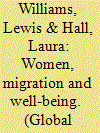

|
|
|
|
|
| Publication |
2014.
|
| Summary/Abstract |
Today, the less desirable fruits of the Western growth paradigm are readily apparent as we are confronted with significant threats to our collective well-being. Such threats include: environmental degradation, increasing health, wealth and power disparities, forced migrations and on-going violent conflicts between groups. These problems have been recognized as interrelated with the same root cause: the almost total dominance of the particular assumptions, worldview and social practices of the modern paradigm.2 Correspondingly, it is increasingly argued that human security and well-being are closely connected to linking social and ecological resilience through the re-integration of onto-epistemologies3 of deep interconnectedness into human progress and well-being narratives, worldviews closely associated with Indigenous and other traditional peoples.4 Paradoxically, it is these same peoples, particularly impoverished women and children, who have often borne the brunt of the modernist development paradigm. Whether through inter-racial and ethnic conflict, or for environmental or economic reasons, these seemingly disparate communities are often similarly positioned at the margins of society as a result of forced migration, ensuing cultural dislocation and resulting psycho-spiritual distress.
|
|
|
|
|
|
|
|
|
|
|
|
|
|
|
|
|
|
|
|
|